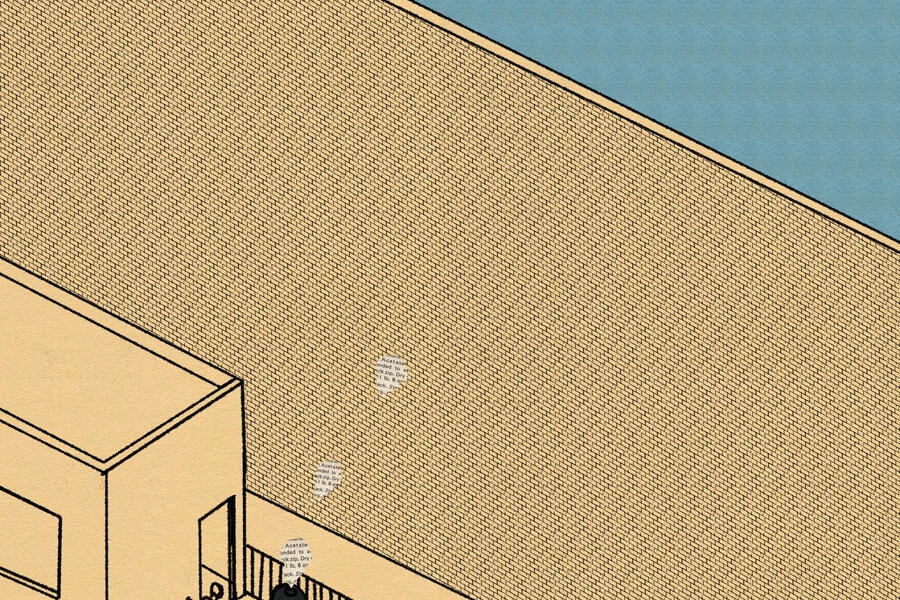Nine years ago, anthropology Professor Anand Pandian concluded that the subject of his fifth book would be plastic—particularly, the proliferation of plastic containers in our modern lives and their environmental impact. But then Donald Trump won his first presidential election behind the slogan "Build the Wall." As an American-born son of Indian immigrants, Pandian says he was troubled by this phrase and decided to think outside the plastic box. "Trump promised again and again the idea of a border wall that would be impervious, impermeable, and built of concrete," Pandian says. "It seemed to me that it was scaling up the same ideology of containment."
Something Between Us: The Everyday Walls of American Life and How to Take Them Down was published in May by the Stanford University Press. The first part of the title is a quote from writer James Baldwin and brings dual meanings: The "something" could be a barrier dividing us or a shared understanding fueling unity. Anthropologists, Pandian says, aim to "make sense of social lives, social realities, and collective commitments" and have a duty "to meet people with as much empathy and understanding as we can muster." And so, he spent some eight years crisscrossing the country exploring the various "somethings" both separating and uniting us, speaking with participants at everything from a White Lives Matter rally to Las Vegas' World of Concrete trade show.
The proposed border wall might have prompted the book—and folks at the World of Concrete show applauded the concept but doubted there'd ever be enough of their namesake product to build it—but Pandian found walls everywhere. They were "in the fortress-like nature of the homes that so many people live in, the cars that are becoming ever bigger, the way that people think about their bodies in highly defensive terms, and of course these phones and other social media devices whose frames are walls of their own," he says.
He learned about the proliferation of gated communities and houses swapping front porches for garage doors as alfresco domestic life moves to private rear yards. These lifestyle choices—often marketed for security reasons—reduce regular encounters with strangers. "And you can imagine how a politics based on fear of the unknown, or the risks that strangers carry, gains a foothold because it resonates in some way with these habits of living," Pandian says.
Meanwhile, the pickups and SUVs now accounting for the bulk of U.S. vehicle sales are increasingly large, and folks at auto shows tell him it's all about the perceived safety of their occupants. Undiscussed is the safety of those outside the steel giants, the 50% increase in pedestrian deaths over the past decade, and research from the Insurance Institute for Highway Safety showing a correlation between increasing vehicle size and pedestrian fatality rates.
His initial focus on the proliferation of plastic comes to the fore at a bottled water convention where, here too, "safety" was a prevailing selling point. "It was as if your water wasn't safe unless you were cracking the seal on a bottle yourself, and that you shouldn't expose yourself to something that hadn't been sealed off to begin with," Pandian says. This thinking diminishes the shared value of municipal water systems—walling off a bodily necessity in ways both costly and wasteful.
There are also tales of activists breaking down walls, including Mark Baumer, who was walking barefoot across the country to highlight the climate crisis until he was killed by a speeding motorist in an SUV. "He was willing to talk to whomever he passed," Pandian says. "The hope that animates this book is founded on what can happen if we're willing to seek out commonality with people that are unlike us."
Also see
Is showing up truly half the battle? Pandian wandered into some racially charged gatherings as the only self-described "brown man." "I felt a great deal of nervousness and vulnerability and discomfort," he says. "But there were other circumstances in which the very fact that I was in these places—and interested in talking to people who may not always have interacted with someone like me— made a real difference. It showed an open-mindedness."
Something Between Us was born amid political turbulence that has only deepened since it was published. But Pandian remains hopeful. "Every bubble and every boundary is impermanent," he says. "Every wall will come down in one way or another. This is not viable politics for the long run, and I think people are seeing that. As people continue to organize with different visions of collective life in mind, we will see the emergence of other ways of being together again as Americans."
Posted in Politics+Society
Tagged anthropology, politics, environmental health, american history, democracy








